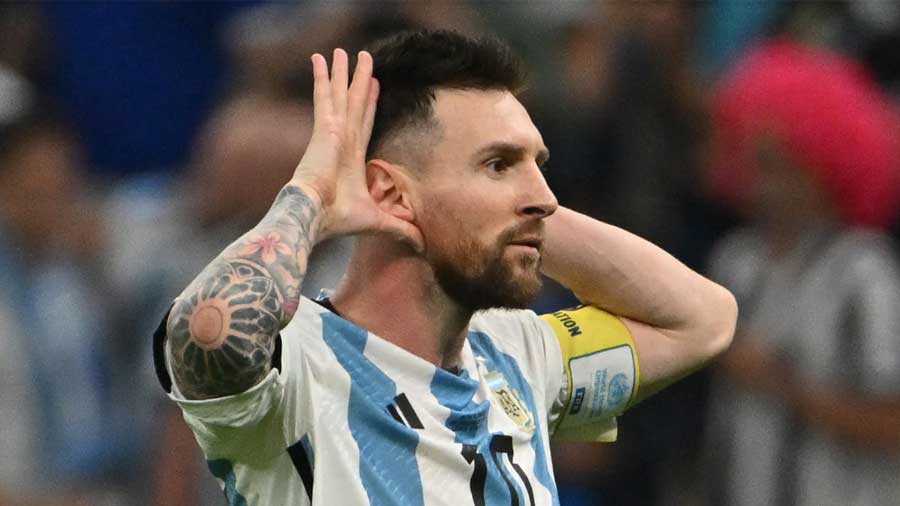“Diego is watching us from heaven. He is pushing us,” Lionel Messi said last week in Qatar.
If indeed Diego Maradona is looking down from above, he may well be surprised.
For, the boy from Rosario he had chided for “lacking personality as a leader” — the ideas of personality and leadership construed in a very Argentine way — has seemingly undergone a transformation this World Cup. It was most starkly evident after the acrimonious quarter-final against the Netherlands on December 9.
The no-drama Barcelona superstar who would suffer opponents’ kicks and refereeing injustices without a word and just get on with the game mocked the Dutch coach, lambasted the match official, and rudely told off an opposing player.
All this verbal aggression, according to a popular narrative, has got Argentine fans to warm up like never before to a man they called too “cold” and more “European” than “Argentine”, comparing him unfavourably with the incandescent Maradona, the 1986 World Cup hero they worshipped.
So, when Lionel Messi leads his side onto the field against France for Sunday’s World Cup final, seeking to match Argentina’s greatest sporting icon in achievement, should he be trying to emulate him in attitude too?
Is this channelling of Messi’s “inner Maradona” key to Argentina’s success? Yes, believes celebrated football coach Arsene Wenger, a Frenchman.
“He (Messi) is the difference maker. This Argentina team has a bunch of youngsters who will be playing their first World Cup final. And to them the captain is not just a decisive player; the badass is the binding factor too,” Wenger said.
Perhaps the best — or worst — instance of his “badass” behaviour came during Messi’s media interaction after the quarterfinal, when the shy introvert who would till the other day just look down and mumble answers in monosyllables rudely told off an opposing player.
“What are you looking at, you idiot, go on, get out of there,” Messi spat out at Wout Weghorst after catching the Dutch striker lurking at the corner.
Earlier in the night, he had celebrated his goal provocatively in front of Netherlands coach Louis van Gaal, cupping his ears, and later telling him: “You talk too much.”
This was apparent retaliation for Van Gaal’s pre-match jibe that Messi doesn’t help his team’s defence enough. The ear-cupping was a mimicking of goal celebrations by former Argentina midfielder Juan Roman Riquelme, whom the Dutchman was accused of ill-treating as Barcelona coach two decades ago.
Some of Messi’s fellow footballers, who used to argue that the man always led on the field and that leadership came in many forms, agree that Qatar is witnessing a new Messi.
“Yes, it’s a little more noticeable. He leads the team in a way I love,” said Pablo Zabaleta, former Argentina teammate.
“I like to see him angry, and participative in many issues that we perhaps saw to a lesser extent in the past. Now he is being more of a leader than ever.”
Maxi Rodriguez, another of Messi’s former Argentina teammates, saw it a little differently: “He always had it, it’s just getting magnified because of social media. (Earlier), there wasn’t so much social media; so even if we did a lot of things it never went out. Leo has always been a leader.”
However, to every outburst such as the ones after the Netherlands game, there will be other images, such as Messi’s warm embrace of Croatia captain Luka Modric — a Real Madrid rival and fellow Ballon d’Or winner — after the semi-finals.
To many Messi fans, a far more enduring image of his leadership than his attack on Van Gaal came after the winning penalty against the Dutch.
As almost all his teammates rushed towards the scorer, Lautaro Martinez, the captain ran in the opposite direction to congratulate the prostrate goalkeeper Emiliano Martinez, the real hero of the shootout.
So, this invites the question: What if Argentina lose to France on Sunday? Will the old accusations about a lack of leadership return?
One possible answer came after Tuesday’s semi-final from an Argentine journalist.
“I just want to tell you that no matter the result, the fact is, you resonated with Argentinians, every single one. There’s no kid who doesn’t have your shirt, no matter if it’s fake, real or a homemade one,” journalist Sofia Martinez told a visibly moved Messi.
“Truly you made your mark in everyone’s life and that to me is beyond winning any World Cup. No one else can take that from you and this is my gratitude, for such happiness you bring to a lot of people…. I really believe that’s more important than winning a World Cup, and you already have it, so thank you, captain.”
To many others taking a more dispassionate view, Messi has already lit up this World Cup with his goals and flashes of genius such as the laser-guided pass to Nahuel Molina against the Dutch and the destruction of Josko Gvardiol against Croatia.
Javier Zanetti, a widely respected former Argentina captain whose career overlapped with both Maradona’s and Messi’s, seemed to agree.
“Leo is on the same level as Diego. And this judgement will not change even if Sunday’s result is not in our favour,” he said.











